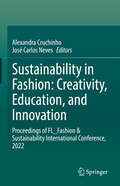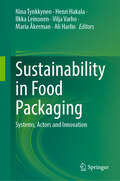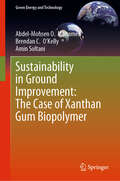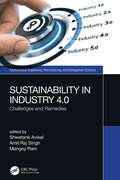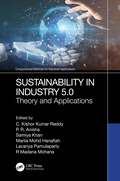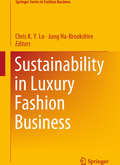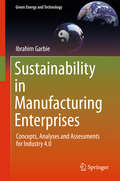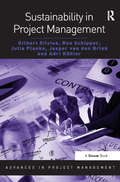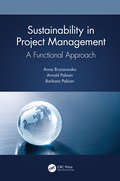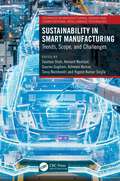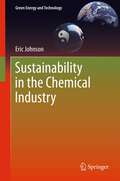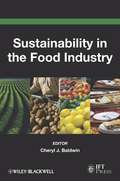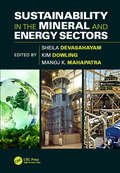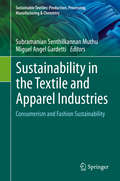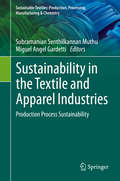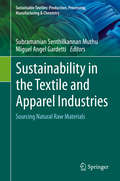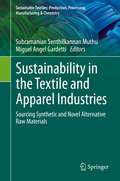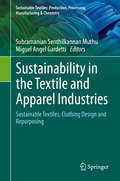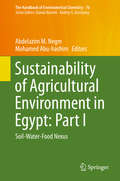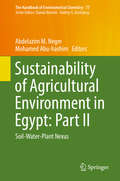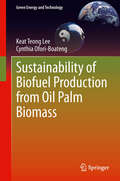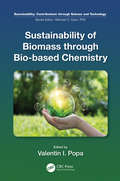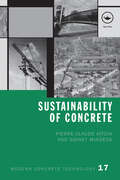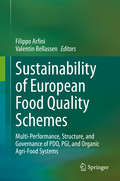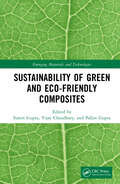- Table View
- List View
Sustainability in Fashion: Proceedings of FL_Fashion & Sustainability International Conference, 2022
by Alexandra Cruchinho José Carlos NevesSustainability in Fashion: Creativity, Education, and Innovation is a book that focuses on how sustainability can be integrated into the fashion and clothing industry. The set of chapters provides peer-reviewed research covering a wide range of topics, mainly focused on how sustainability can be incorporated into fashion and textile education, how consumer behaviour and marketing affect sustainability in fashion (and vice versa) and how circular economy principles can be incorporated into clothing and textile supply chains. The chapters in this proceedings volume examine sustainability not only from the perspective of academia, but also from the perspective of industry. Working across sectors in this manner can facilitate the development of real projects that can greatly contribute to sustainability in the fashion industry.
Sustainability in Food Packaging: Systems, Actors and Innovation
by Henri Hakala Nina Tynkkynen Ilkka Leinonen Vilja Varho Maria Åkerman Ali HarlinThe sustainability of food packaging is a key priority in the food industry, as plastic waste and littering have become global concerns. Packaging waste accounts for over half of total global waste, predominantly from single-use plastic food packaging. Production of packaging consumes significant natural resources and contributes to climate change and pollution. However, packaging is also crucial for reducing food waste, protecting food safety, and providing vital information about contents, making it an essential sustainability solution, not just a problem. Sustainability Transition in Food Packaging: Systems, Actors, and Innovation explores sustainable food packaging from an interdisciplinary perspective, integrating economics, environmental science, technology, social sciences and cultural studies. This broad approach expands beyond the traditional focus on packaging as a product, considering its content and the services it provides. While sustainable packaging is often defined by four principles—effectiveness, efficiency, circularity, and safety—current applications primarily focus on the packaging itself, overlooking broader impacts such as marine and soil littering. Life cycle assessments (LCA) of packaging frequently ignore social, cultural, and economic sustainability aspects and often fail to account for the diverse interpretations of LCA standards. While the Product Environmental Footprint (PEF) offers a uniform solution, challenges remain due to undefined packaging category rules. Food packaging is rapidly evolving, driven by innovation, political action, and consumer demand. Given the global and varied nature of the food supply chain, one-size-fits-all solutions are insufficient. This book offers a holistic, interdisciplinary approach to sustainability, fostering dialogue and research across different research fields. It examines different conceptualizations of sustainable food packaging including methods for analyzing sustainability. The volume introduces novel methodologies, such as LCA with a focus on littering, and provides insights on overcoming the challenges of transitioning to a more sustainable food packaging system.
Sustainability in Ground Improvement: The Case of Xanthan Gum Biopolymer (Green Energy and Technology)
by Abdel-Mohsen O. Mohamed Brendan C. O’Kelly Amin SoltaniSustainable soil stabilization solutions aim to maintain a perfect balance between infrastructure performance and the social, economic and ecological processes required to sustain human equity, diversity, and the functionality of natural systems. To this end, biopolymers, either chemically synthesized from biological matter or biosynthesized by living organisms, are exhibiting great promise as a financially competitive and green alternative for conventional calcium-based binders. Recent experimental studies have shown that soils stabilized by polysaccharide-type biopolymers, such as xanthan gum (XG), exhibit a variety of promising physical and mechanical treatments, including improved water-retention capacity, reduced compressibility and hydraulic conductivity, enhanced shear strength, and improved resistance against wind/water erosion. Despite these advancements, the existing literature reveals numerous inconsistencies, and a thorough understanding of the behaviour/properties of XG-treated soils under diverse loading and environmental conditions remains somewhat elusive. More importantly, there remains a notable gap in understanding how different factors affect the interactions between XG and various soil types throughout the processes of mixing, curing, and later environmental exposure. This book represents the first of its kind, offering a comprehensive, fundamental overview of the current state of XG usage for sustainable ground improvement, while also identifying future research directions towards addressing existing gaps in knowledge and application.
Sustainability in Industry 4.0: Challenges and Remedies (Mathematical Engineering, Manufacturing, and Management Sciences)
by Shwetank AvikalA large and growing number of manufacturers are realizing the substantial financial and environmental benefits of sustainable business practices. To develop more sustainable societies, industries need to better understand how to respond to environmental, economic, and social challenges and transform industrial behavior. The objective of this book is to provide the required knowledge and accelerate the transition towards a sustainable industrial system. The book will help industries to enhance operational efficiency by reducing costs and waste. It will help them increase customer response, reach new customers, and gain competitive advantage. It offers innovation, scenario planning, and strategic analysis that goes beyond compliance, as well as case studies and remedies to the industry 4.0 challenges. Professionals, as well as students, can refer to this book to add to their knowledge on Industry 4.0 and develop new ideas and solutions to the existing and future problems.
Sustainability in Industry 5.0: Theory and Applications (Computational Methods for Industrial Applications)
by Samiya Khan Marlia Mohd Hanafiah C Kishor Kumar Reddy P R Anisha Lavanya Pamulaparty R Madana MohanaThe text emphasizes the need for data pre-processing, classification and prediction, cluster analysis, mining multimedia, and advanced machine learning techniques for scientific programming in Industry 5.0. • Addresses how the convergence of intelligent systems and 5G wireless systems will solve industrial problems such as autonomous robots, and self-driving cars. • Highlights the methods of smart things in collaborative autonomous fleets and platforms for integrating applications across different business and industry domains. • Discusses important topics such as the Internet of robotic things, cloud robotics, and cognitive architecture for cyber-physical robotics. • Explains image compression, and advanced machine learning techniques for scientific programming in Industry 5.0. • Presents a detailed discussion of smart manufacturing techniques, industrial Internet of things, and supply chain management in Industry 5.0. The text is primarily written for graduate students and academic researchers in the fields of industrial engineering, manufacturing engineering, electrical engineering, production engineering, and mechanical engineering.
Sustainability in Luxury Fashion Business (Springer Series in Fashion Business)
by Chris K. Y. Lo Jung Ha-BrookshireThis book explores new approaches and strategies that luxury fashion brands could adopt in their operations toward sustainability goals. It addresses the unique challenges faced by luxury fashion brands, given that concepts of luxury and sustainability may be conflicting. In doing so, it elaborates on how fashion brands need to manage their suppliers to comply with and improve social and environmental conditions, the pressure to fulfill the triple-bottom lines, consumer demands for transparency, and social media and its advantages in achieving sustainability goals. Exploring the notion that luxury fashion brands are in a better position to pursue superior sustainability performance, it presents research that highlights how the consequences of non-compliance could have more devastating effects on luxury brands than on mass-market brands. The book is a valuable resource for academics and practitioners in the field of business, sustainability, and fashion.
Sustainability in Manufacturing Enterprises
by Ibrahim GarbieThis book explores sustainability within manufacturing enterprises and examines the concepts and principles of this field. It also reviews the quantitative and qualitative tools available for analytic assessment. It presents a new framework for sustainable manufacturing requirements and discusses the implementation of sustainable manufacturing in terms of practices, indicators, and sustainability level assessments. The book also details the important conditions necessary for the conversion of existing traditional plants to ones with more sustainable processes. Chapters explore topics including the assessment of economic sustainability, social sustainability, environmental sustainability, sustainable manufacturing practices, and sustainability optimization. Serving as a reference for engineers, managers, and practitioners involved in manufacturing, this book will also be a valuable resource to students and researchers of industrial engineering, manufacturing engineering, systems engineering, and operations management.
Sustainability in Project Management (Advances in Project Management)
by Gilbert Silvius Ron Schipper Julia Planko Jasper van BrinkThe concept of sustainability has grown in recognition and importance. The pressure on companies to broaden their reporting and accountability from economic performance for shareholders, to sustainability performance for all stakeholders is leading to a change of mindset in consumer behaviour and corporate policies. How can we develop prosperity without compromising the life and needs of future generations? Sustainability in Project Management explores and identifies the questions surrounding the integration of the concepts of sustainability in projects and project management and provides valuable guidance and insights. Sustainability relates to multiple perspectives, economical, environmental and social, but also to responsibility and accountability and values in terms of ethics, fairness and equality. The authors will inspire project managers to be aware of these considerations, and to apply them to the role they play in projects, not just 'doing things right' but 'doing the right things right'.
Sustainability in Project Management: A Functional Approach
by Anna Brzozowska Arnold Pabian Barbara PabianThis book presents a new approach to the issue of project management, showing how it can be approached through the lens of sustainability. The nature of sustainable project management is not only to achieve economic goals, but also environmental and social ones. Considering project management from the perspective of sustainability is very important because sustainable development cannot keep up with the pace and scale of accumulation of ecological and social problems. The natural potential of the Earth is quickly running low. The global equilibrium between the Earth’s ecosystems, which have developed for millions of years, and the human world of production and consumption, becomes disrupted. The focus is on a functional approach to the subject, allowing management and business to implement the methodology discussed. Topics discussed include sustainable planning, sustainable organizing, sustainable leading and sustainable controlling. The authors use their combined experience in the area to inform their novel approach. The book will be especially useful for people who are project managers, members of project teams and other project stakeholders. It may also be a useful reference for scientists and students studying the fields of management, IT and business.
Sustainability in Smart Manufacturing: Trends, Scope, and Challenges (Advances in Manufacturing, Design and Computational Intelligence Techniques)
by Ashwani Kumar Yogesh Kumar Singla Saumya Shah Hemant Nautiyal Gaurav Gugliani Tanuj NamboodriThis text highlights the role of artificial intelligence-powered robots and automation systems in revolutionizing digital manufacturing, covers prod-uct design and customization, and discusses various artificial intelligence algorithms for manufacturing processes and supply chain optimization. It further covers the applications of 3D printing and rapid prototyping for low-carbon development. Features:• Discusses microwave hybrid heating based on innovative joining tech-niques, applications of 3D printing, and rapid prototyping for low carbon development• Explains the role of artificial intelligence in digital manufacturing, data security, privacy issues, and defense mechanism• Provides an overview of artificial intelligence-powered robots and automation systems for revolutionizing digital manufacturing, and techniques for soft robotic structures• Presents case studies related to Six Sigma, digital manufacturing, and supply chain manufacturing• Explains artificial intelligence and machine learning-based high-predicted models for accurate data analysis in industry automationIt is primarily written for senior undergraduate, graduate students, and academic researchers in the fields of manufacturing engineering, industrial engineering, production engineering, mechanical engineering, and aerospace engineering.
Sustainability in the Chemical Industry
by Eric JohnsonIt's the new rock and roll. It's the new black. Sustainability is trendy, and not just among hipsters and pop stars. The uncool chemical sector helped pioneer it, and today, companies inside and outside the sector have embraced it. But what have they embraced? Surely not the Brundtland definition of meeting "the needs of the present without compromising the ability of future generations to meet their own needs." Sustainability describes a change in the chemical industry's approach to the external world: to regulators, to greens, to neighbors, to investors and to the general public. Displacing the adversarialism of the 1970s-80s, sustainability is a new approach to social/political conflict, and an attempt to rebuild the industry's long-suffering public image. In practice, it consists of: A 'stakeholder' approach to communications and external relations A rebranding of regulatory compliance and risk management, with the emphasis on their benefits to stakeholders Recognition (and even celebration) of the opportunities, not just the costs, of environmental and social protection The core of this book is a survey of the world's 29 largest chemical companies: how they put sustainability into action (six of the 29 do not), and the six 'sustainability brands' they have created. It begins with a history of stakeholders conflict, before looking at various definitions of sustainability - by academics, by the public and by investors. After the survey and analysis, the book covers sustainability and 'greenwash' plus the ROI of sustainability, and it gives five recommendations.
Sustainability in the Food Industry (Institute of Food Technologists Series #35)
by Cheryl BaldwinSustainability is beginning to transform the food industry with environmental, economic and social factors being considered, evaluated and implemented throughout the supply chain like never before. Sustainability in the Food Industry defines sustainability with a comprehensive review of the industry’s current approach to balancing environmental, economic and social considerations throughout the supply chain. In addition, tools and information are provided to enhance future progress. To achieve this, the book combines technical research summaries, case studies and marketing information. Coverage includes sustainability as it relates to: agricultural practices, food processing, distribution, waste management, packaging, life cycle analysis, food safety and health, environmental labeling, consumer insight and market demand, product development, practices in food manufacturing companies, food retailing and food service. An international group of authors covers the information from a global perspective. Sustainability in the Food Industry offers an overview of sustainable sources of impact and improvement, how they relate to the key sectors of the food industry and how programs may be implemented for further improvement.
Sustainability in the Mineral and Energy Sectors
by SHEILA DEVASAHAYAM, KIM DOWLING and MANOJ K. MAHAPATRASustainable practices within the mining and energy sectors are assuming greater significance due to uncertainty and change within the global economy and safety, security, and health concerns. This book examines sustainability issues facing the mining and energy sectors by addressing six major themes: Mining and Mineral Processing; Metallurgy and Recycling; Environment; Energy; Socioeconomic and Regulatory; and Sustainable Materials and Fleets. Emphasizing an integrated transdisciplinary approach, it deliberates on optimizing mining productivity and energy efficiency and discusses integrated waste management practices. It discusses risk management, cost cutting, and integration of sustainable practices for long-term business value. It gives a comprehensive outlook for sustainable mineral futures from academic and industry perspectives covering mine to mill optimization, waste, risk and water management, improved efficiencies in mining tools and equipment, and performance indicators for sustainable developments. It covers how innovation and research underpin management of natural resources including sustainable carbon management. •Focuses on mining and mineral processing, metallurgy and recycling, the environment, energy, socioeconomic and regulatory issues, and sustainable materials and fleets. •Describes metallurgy and recycling and uses economic, environmental and social parameter analyses to identify areas for improvement in iron, steel, aluminium, lead, zinc, copper, and gold production. •Discusses current research on mining, performance indicators for sustainable development, sustainability in mining equipment, risk and safety management, and renewable energy resources •Covers alternative and conventional energy sources for the mineral sector as well water treatment and remediation and energy sustainability in mining. •Provides an overview of sustainable carbon management. •Offers an interdisciplinary approach with international focus.
Sustainability in the Textile and Apparel Industries: Consumerism and Fashion Sustainability (Sustainable Textiles: Production, Processing, Manufacturing & Chemistry)
by Subramanian Senthilkannan Muthu Miguel Angel GardettiThis book is part of a five-volume set that explores sustainability in textile industry practices globally. Case studies are provided that cover the theoretical and practical implications of sustainable textile issues, including environmental footprints of textile manufacturing, consumer behavior, eco-design in clothing and apparels, supply chain sustainability, the chemistry of textile manufacturing, waste management and textile economics. The set will be of interest to researchers, engineers, industrialists, R&D managers and students working in textile chemistry, economics, materials science, and sustainable consumption and production. This volume focuses on sustainability aspects of consumerism and fashion, emphasizing the environmental issues that stem from textile care and disposal, and how many of these practices detrimentally impact the environment. Also addressed is the role of consumer knowledge and behavior associated with the clothing industry that may exacerbate these issues, and what can be done to better inform consumers about more sustainable options available to them. The case studies presented cover environmental and social sustainability in the clothing industry, and sustainable development in luxury fashion networks.
Sustainability in the Textile and Apparel Industries: Production Process Sustainability (Sustainable Textiles: Production, Processing, Manufacturing & Chemistry)
by Subramanian Senthilkannan Muthu Miguel Angel GardettiThis book is part of a five-volume set that explores sustainability in textile industry practices globally. Case studies are provided that cover the theoretical and practical implications of sustainable textile issues, including environmental footprints of textile manufacturing, consumer behavior, eco-design in clothing and apparels, supply chain sustainability, the chemistry of textile manufacturing, waste management and textile economics. The set will be of interest to researchers, engineers, industrialists, R&D managers and students working in textile chemistry, economics, materials science, and sustainable consumption and production.This volume addresses the technologies and mechanical processes of textile production, and what sustainable methods can be employed to achieve improved safety and environmental health. The book covers sustainable aspects of printing, dyeing, coloration, weaving, knitting, tailoring, surface design and antimicrobial finishing for environmentally friendly textile and apparel products.
Sustainability in the Textile and Apparel Industries: Sourcing Natural Raw Materials (Sustainable Textiles: Production, Processing, Manufacturing & Chemistry)
by Subramanian Senthilkannan Muthu Miguel Angel GardettiThis book is part of a five-volume set that explores sustainability in textile industry practices globally. Case studies are provided that cover the theoretical and practical implications of sustainable textile issues, including environmental footprints of textile manufacturing, consumer behavior, eco-design in clothing and apparels, supply chain sustainability, the chemistry of textile manufacturing, waste management and textile economics. The set will be of interest to researchers, engineers, industrialists, R&D managers and students working in textile chemistry, economics, materials science, and sustainable consumption and production. This volume comprehensively covers the various sustainable natural materials used in textiles that originate from raw materials sourcing. The book discusses agricultural production systems and standards for the development of sustainable textile fibers, the effects of chemical surface modification methods on the properties of textile fibers, and how antibacterial and antifungal textiles can be manufactured using natural resources.
Sustainability in the Textile and Apparel Industries: Sourcing Synthetic and Novel Alternative Raw Materials (Sustainable Textiles: Production, Processing, Manufacturing & Chemistry)
by Subramanian Senthilkannan Muthu Miguel Angel GardettiThis book is part of a five-volume set that explores sustainability in textile industry practices globally. Case studies are provided that cover the theoretical and practical implications of sustainable textile issues, including environmental footprints of textile manufacturing, consumer behavior, eco-design in clothing and apparels, supply chain sustainability, the chemistry of textile manufacturing, waste management and textile economics. The set will be of interest to researchers, engineers, industrialists, R&D managers and students working in textile chemistry, economics, materials science, and sustainable consumption and production. This volume explores some alternative synthetic raw materials resulting from the recycling and regeneration of renewable textile fibers, and how these sustainable green-based composites can contribute to improved ecological and human health. The book offers insights into the impacts of human-made fibers and microfiber pollution, and how biodegradable material sourcing can help to curb harmful environmental impacts from these practices and achieve clothing and apparel sustainability.
Sustainability in the Textile and Apparel Industries: Sustainable Textiles, Clothing Design and Repurposing (Sustainable Textiles: Production, Processing, Manufacturing & Chemistry)
by Subramanian Senthilkannan Muthu Miguel Angel GardettiThis book is part of a five-volume set that explores sustainability in textile industry practices globally. Case studies are provided that cover the theoretical and practical implications of sustainable textile issues, including environmental footprints of textile manufacturing, consumer behavior, eco-design in clothing and apparels, supply chain sustainability, the chemistry of textile manufacturing, waste management and textile economics. The set will be of interest to researchers, engineers, industrialists, R&D managers and students working in textile chemistry, economics, materials science, and sustainable consumption and production. This volume discusses novel trends and concepts in sustainable textile design, including innovative topics such as doodling and upcycling in clothing and apparel design for sustainable fashion initiatives. Along with strategies for repurposing fashion sustainability, the book also covers university interventions for the development of proper and environmentally friendly design practices. Specific technologies addressed include UV applications, laser treatments for dyeing, refined surface design techniques for products such as leather.
Sustainability of Agricultural Environment in Egypt: Soil-Water-Food Nexus (The Handbook of Environmental Chemistry #76)
by Abdelazim M. Negm Mohamed AbuhashimThis volume discusses the sustainability of Egypt’s agriculture and the challenges involved. It provides a comprehensive review and the latest research findings, and covers a variety of topics under the following themes: · Applicability of sustainable agriculture in Egypt · Sustainable agriculture under water scarcity and polluted soil environments · Improved crop productivity using a variety of tried and tested procedures · Biotechnology application for agricultural sustainability and food security · Potentiality of soil-sensing for a more sustainable agricultural environment The volume closes with a summary of the key conclusions and recommendations from all chapters. Together with the companion volume Sustainability of Agricultural Environment in Egypt: Part II, it offers an essential source of information for postgraduate students, researchers, and stakeholders alike.
Sustainability of Agricultural Environment in Egypt: Soil-Water-Plant Nexus (The Handbook of Environmental Chemistry #77)
by Abdelazim M. Negm Mohamed Abu-HashimThis volume discusses the sustainability of Egypt’s agriculture and the challenges involved. It provides a comprehensive review and the latest research findings, and covers a variety of topics under the following themes: · Integrated natural resources management for sustainable production · Integrated biopesticides and biofertilizers for sustainable agriculture · Integrated plant and animal production for a sustainable food supply · Policies for sustainable agriculture in Egypt The volume closes with a summary of the key conclusions and recommendations from all chapters. Together with the companion volume Sustainability of Agricultural Environment in Egypt: Part I, it offers an essential source of information for postgraduate students, researchers, and stakeholders alike.
Sustainability of Biofuel Production from Oil Palm Biomass
by Cynthia Ofori-Boateng Keat Teong LeeThis book evaluates and discusses the main sustainability challenges encountered in the production of biofuel and bio-products from oil palm biomass. It starts off with the emphasis on oil palm production, oil palm products recovery and oil palm wastes utilization. The simultaneous production of these bio-products for sustainable development is discussed. This is followed by the key factors defining the sustainability of biofuel and bio-product production from oil palm biomass. The environmental issues including ecological, life cycle assessment and environmental impact assessment of oil palm plantation, milling and refining for the production of biofuels and bio-products are presented. Socio-economic and thermodynamic analysis of the production processes are also evaluated using various sustainability assessment tools such as exergy. Lastly, methods of improving biofuel production systems for sustainable development are highlighted.
Sustainability of Biomass through Bio-based Chemistry (ISSN)
by Valentin I. PopaThe process of photosynthesis is a potential source of energy and bioproducts. Renewable sources of polymeric materials offer an answer to maintaining sustainable development of economically and ecologically attractive technology. The innovations in the development of materials from biopolymers, preservation of fossil-based raw materials, complete biological degradability, reduction in the volume of garbage and compostability in the natural cycle, climate protection through reduction of carbon dioxide released, and the application possibilities of agricultural resources for the production of bio/green materials are some of the reasons why such materials are attracting public interest.FEATURES Discusses waste from urban areas, forestry and agricultural processes, specifically grown crops such as trees, starch crops, sugar crops hydrocarbon plants and oils, and finally aquatic plants such as water seaweeds and algae, which can be used as raw materials for sustainable development. Presents recent advances in the development of some specifically chemical components of biomasses for a sustainable future. Focuses on lignocellulose as a source of bio-based products. Draws upon expertise from various countries. Describes how upgraded and integrated biomass processing may reduce the risks associated with the COVID-19 pandemic. Valentin I. Popa is professor emeritus of Wood Chemistry and Biotechnology at Gheorghe Asachi Technical University of Iasi, Romania.
Sustainability of Concrete (Modern Concrete Technology)
by Sidney Mindess Pierre-Claude AitcinProduction of Portland cement is responsible for about seven percent of the world's greenhouse gas emissions. The pressure to make the production of concrete more sustainable, or "greener", is considerable and increasing. This requires a wholesale shift in processes, materials and methods in the concrete industry. Pure Portland cement will nee
Sustainability of European Food Quality Schemes: Multi-Performance, Structure, and Governance of PDO, PGI, and Organic Agri-Food Systems
by Valentin Bellassen Filippo ArfiniThis edited volume evaluates recent EU quality policy, focusing on the structure, governance, technical specifications and performances – economic, environmental and social – of Food Quality Schemes (FQS) in the European Union and South East Asia. The intended benefits of FQS include generating a fair return for farmers and producers, and enabling consumers to make better‐informed purchasing choices through effective labeling. In addition, policy makers now consider FQS as a means of guaranteeing not only quality in food production, but also sustainability. Despite these potential benefits, the economic performance of the FQS (e.g. PDO, PGI, organic) has been variable. While some support significant value‐added production, with substantial benefits to producers, consumers and wider economies, many others have failed to become economically sustainable. In addition, the environmental and social performance of FQS remains largely unexamined, with the exception of the environmental performance of organic products. The editors examine these discrepancies and offer a nuanced evaluation of the effectiveness of such policies. Several unique features make this volume a key resource for those interested in FQS and in the sustainability of food products. The editors provide a concise description of the value chain, the governance and the technical specifications of 27 FQS in Europe and South East Asia. The editors also provide a sustainability assessment of each of these FQS, and support or question the view that FQS are moving from “quality” to “sustainability.” Finally, the volume serves as a repository of key data on these FQS. Readers have access to the raw data necessary to compute the indicators used in the sustainability assessment (eg. value added, number of jobs, quantity of fertilizers, etc), allowing them to conduct novel re-analysis. The book is designed for an interdisciplinary audience of academics, policy makers, and stakeholders. The compilation of FQS case studies makes it a useful reference for researchers and students of food policy, geography, food anthropology, local and rural development, local agri-food systems and agri-food chains. Stakeholders such as national and European regulators, entities responsible for FQS technical specifications, and embassy staff will also find the information relevant. Additionally, individuals helping to implement food quality schemes, including auditors, producers, and consumer associates, as well as stakeholders in the sustainability of food products, including farmers, farmer's associations, and environmental NGOs, will also find the information relevant and important for their work.
Sustainability of Green and Eco-friendly Composites (Emerging Materials and Technologies)
by Sumit Gupta Pallav Gupta Vijay ChaudharyThe book explores the pertinent aspects of sustainability of green and eco-friendly composites including their development methods and processing, characterization, properties, and applications. Significance for the design and engineering of high-performance green and eco-friendly composites is discussed in the present book. Insights on a wide spectrum of potential advanced applications ranging from automotive and aerospace to biomedical and packaging, etc. using these are highlighted. Further, it discusses life cycle and carbon footprint assessment of sustainable materials. Features: Explores different processing methods of green and eco-friendly composites. Discusses development and optimization of green nanocomposites for sustainable manufacturing. Collates modern green and eco-friendly composites research from theory to application. Covers hybridization of reinforced fibers on the performance of green and eco-friendly composites. Analyzes and discusses calculation of carbon footprint and Life Cycle Assessment of composites. This book is aimed at graduate students and researchers in materials science and engineering, sustainable materials, composites, and nanomaterials.
